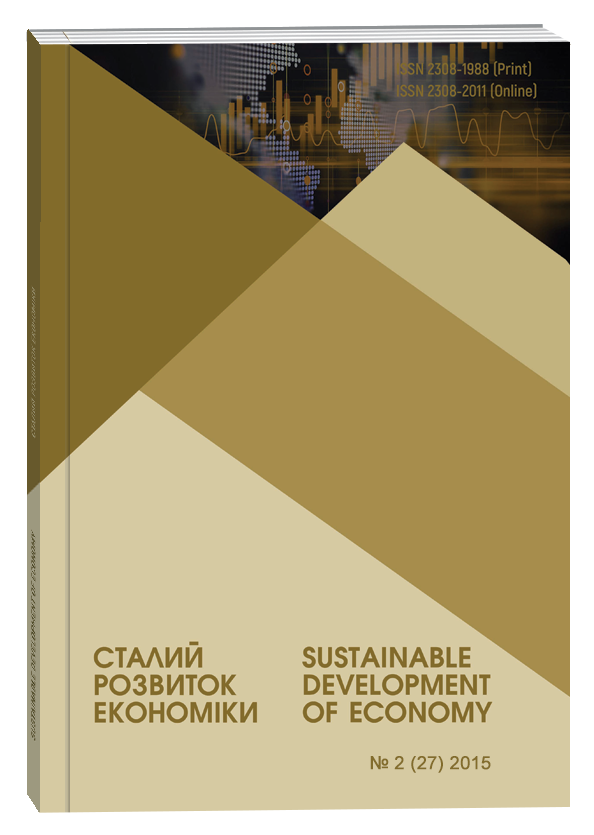СУСПІЛЬНА ДИНАМІКА: ТЕОРІЯ, РЕАЛЬНИЙ СТАН, ПЕРСПЕКТИВИ КЕРОВАНИХ ЗМІН
Анотація
Мета – спроба визначення поняттєво-категоріального апарату суспільної динаміки, а також наукового обґрунтування методології «оцінювання» суспільного поступу загалом і його складових зокрема як механізму управління соціо-еколого-економічними змінами. Методика дослідження. Теоретичною й методологічною основою дослідження є концептуальні положення теорії динаміки складних систем та теорії державного регулювання соціально-еколого-економічних процесів. Вірогідність і обґрунтованість одержаних результатів забезпечена використанням методів статистичного аналізу явищ і процесів, а також методів математичної статистики, експертних оцінок та імітаційного моделювання. Так, виокремлення чинників впливу на складові суспільної динаміки здійснювалося з використанням експертних оцінок та статистичних методів їх опрацювання. Для визначення комплексних та інтегрального показника задіяно потенціал математичного моделювання з агрегуванням локальних характеристик в узагальненні. Результати. Обґрунтовано нову парадигму здійснення моніторингу й оцінки суспільної динаміки, яка зорієнтовує й враховує нерівноважні та незбалансовані процеси зростання й розвитку. Розроблено наукові засади моделювання та безпосередньо модель інтегрального індикатора суспільної динаміки, яка синтезує різні за якістю та кількістю соціальні, екологічні й економічні чинники і забезпечує своєрідний коридор ефективного управлінського впливу. Наукова новизна. Здійснено науково-теоретичне та методологічне обґрунтування базових положень щодо інформаційно-аналітичного забезпечення системи оцінки управлінських рішень на стадії їх формування та управлінських результатів на етапі оцінювання й розробці наукових основ щодо досягнення в управлінській практиці позитивної суспільної динаміки. Практична значущість Репрезентовані розробки створюють основу для теоретико-методологічного обґрунтування процесів формування та оцінки програм суспільного поступу, а також для запровадження організаційно-економічного механізму управління суспільною динамікою із забезпеченням соціального прогресу. Сформовано концептуально нову інструментально-методологічну базу щодо удосконалення системи управління соціально-еколого-економічними змінами і надання більш значущого відношення до них шляхом проведення постійного моніторингу в країні загалом і її регіонах зокрема.
Посилання
Воронкова В.Г. Управління соціально-економічним розвитком та шляхи досягнення стабільності в сучасному соціумі / В.Г. Воронкова // Гуманіт. вісн. ЗДІА. – 2008. – Вип. 32. – С. 20-32.
Щепанський Е.В. Форми та методи управління соціально-економічним розвитком: теоретичний аспект / Е.В. Щепанський // Унів. наук. записки. – 2009. – № 3(31). – С. 273-279.
Кратт О.А. Інструментарій оцінки соціально-економічного розвитку держави / О.А. Кратт, І.О. Кірнос [Електронний ресурс]. – Режим доступу : http://ea.dgtu.donetsk.ua:8080/jspui/handle/123456789/17873.
Тур О.М. Формування еколого-економічного механізму стратегії еколого-орієнтованого розвитку національної економіки / О.М. Тур // Механізм регулювання економіки. – 2011. – № 4. – С. 39- 43.
Душна М.П. Проблеми оцінювання соціо-еколого-економічної збалансованості розвитку / М.П. Душна, І.П. Соловій [Електронний ресурс]. – Режим доступу : http://economics-of- nature.net/uploads/arhiv/2010/Dushina.pdf.
Валенкевич В.П. Обґрунтування оцінки соціо-еколого-економічного розвитку адміністративно- територіальної одиниці / В.П. Валенкевич, О.О. Павленко, Ю.Т. Алібекова // Механізм регулювання економіки. – 2012. – № 3. – С. 16-25.
Корнус А. Історія української географії. Збалансованість еколого-соціально-економічного розвитку північно-східного регіону України [Електронний ресурс] / А. Корнус. – Режим доступу : http://www.irbis-nbuv.gov.ua/cgi-bin/irbis_nbuv/cgiirbis_64.exe?Z21ID=&I21DBN=UJRN&P21DBN=UJRN&S21S.
Прангишвили И.В. Системный подход и общесистемные закономерности / И.В. Прангишвили. – М. : СИН-ТЕГ, 2000. – 528 с.
Великий тлумачний словник сучасної української мови / [уклад. і голов. ред. В.Т. Бусел]. – К. ; Ірпінь : Перун, 2001. – 1728 с.
Новий тлумачний словник української мови : у 3 т. / [уклад. В. Яременко, О. Сліпушко]. – [2-ге вид.]. – К. : Аконіт, 2001. – Т. 3 – 862 с.
Петроченко П.Ф. Экономика труда в промышленности : [учеб. пособие] / П.Ф. Петроченко, И.А. Лесников. – [2-е изд. перераб. и доп.]. – М. : Экономика, 1978. – 264 с.
Удотова Л.Ф. Соціальна статистика : [підручник] / Л.Ф. Удотова. – К. : КНЕУ, 2002. – 376 с.
Гусаров Ю.В. Управление: динамика неравновесности : [науч. изд.] / Ю.В. Гусаров. – М. : Экономика, 2003. – 382 с.
Державна служба статистики України: статистична інформація [Електронний ресурс]. – Режим доступу : www.ukrstat.gov.ua.
Voronkova, V.H. (2008), “Management of socio-economic development and ways to achieve stability in modern society”, Humanit. visn. ZDIA, issue 32, pp. 20-32.
Shchepanskyi, E.V. (2009), “Forms and methods of socio-economic development: theoretical aspect”, Univ. nauk. Zapysky, no. 3(31), pp. 273-279.
Kratt, O.A. and Kirnos, I.O. “Tools for evaluating socio-economic development”, available at: http://ea.dgtu.donetsk.ua:8080/jspui/handle/ 123456789/17873 (access date April 23, 2015).
Tur, O.M. (2011), “Formation of ecological and economic mechanism of ecological-oriented strategy of development of the national economy”, Mekhanizm rehuliuvannia ekonomiky, no. 4, pp. 39-43.
Dushna, M.P. and Solovii, I.P. “Problems evaluating socio-ecological-economic balance of”, available at: http://economicsofnature.net/uploads/arhiv/2010/Dushina.pdf (access date April 25, 2015).
Valenkevych, V.P., Pavlenko, O.O. and Alibekova, Yu.T. (2012), “Justification evaluation of ecological and socio-economic development of the administrative-territorial unit”, Mekhanizm rehuliuvannia ekonomiky, no. 3, pp. 16-25.
Kornus, A. (2008), “History of Ukrainian geography. The balance of ecological and socio-economic development of the north-eastern region of Ukraine”, available at: http://wwwirbis-nbuv.gov.ua/cgi- bin/irbis_nbuv/cgiirbis_64.exe? Z21ID=&I21DBN=UJRN&P21DBN=UJRN&S21S (access date May 5, 2015).
Prangishvili, I.V. (2000), Sistemnyy podkhod i obshchesistemnye zakonomernosti [The systems approach and system-wide patterns], SIN-TEG, Moscow, Russia, 528 p.
Busel, V.T. (2001), Velykyi tlumachnyi slovnyk suchasnoi ukrainskoi movy [Great Dictionary of Modern Ukrainian], Perun, Kyiv, Irpin, Ukraine, 1728 p.
Yaremenko, V. and Slipushko, O. (2001), Novyi tlumachnyi slovnyk ukrainskoi movy : u 3 t. [New Dictionary of Ukrainian language: in 3 vol.], vol.3, Akonit, Kyiv, 862 p.
Petrochenko, P.F. and Lesnikov, I.A. (1978), Ekonomika truda v promyshlennosti [The economy of labor in industry], tutorial, Ekonomika, Moscow, Russia, 264p.
Udotova, L.F. (2002), Sotsialna statystyka [Social statistics], textbook, KNEU, Kyiv, Ukraine, 376 p.
Gusarov, Yu.V. (2003), Upravlenie: dinamika neravnovesnosti [Management: non-equilibrium dynamics], Ekonomika, Moscow, Russia, 382 p.
Derzhavna sluzhba statystyky Ukrainy: statystychna informatsiia [State Statistics Service of Ukraine: statistical information], available at: www.ukrstat.gov.ua (access date March 31, 2015).


